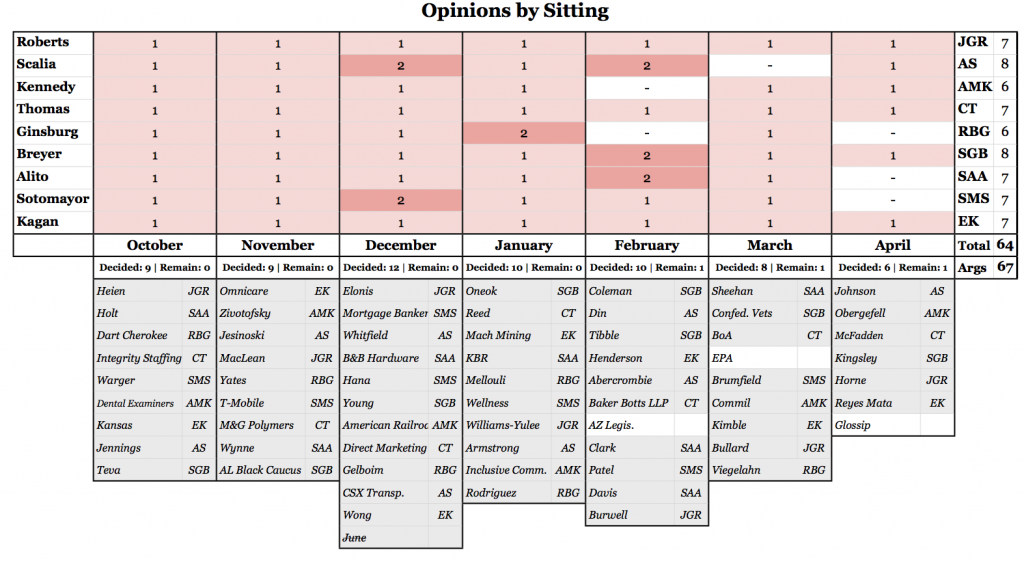In what will probably be the most anticlimactic final day of the term in recent memory, the Court has three outstanding decisions–Arizona St. Legis. v. Az. Ind. Restricting Commission, Michigan v. EPA, and Glossip v. Gross. Based on Kedar Bhatia’s ever-helpful Opinion by Sitting chart, we can speculate about who will write what.
Arizona Leg. is the only outstanding decision from the February sitting. From that sitting, Justices Kennedy and Ginsburg have written nothing. Odds are, it is either Kennedy or Ginsburg with the opinion. But, whoever does not write potentially lost a majority opinion from that sitting to one of the Justices who wrote two opinions. Writing two opinions were Scalia (Din and Abercrombie), Breyer (Coleman and Tibble), and Alito (Clark and Davis). There were two 5-4 decisions among those: Davis v. Ayala and Kerry v. Din. I think Justice Kennedy was originally assigned the majority opinion in Kerry v. Din, but lost Scalia, Roberts, and Thomas. Only Justice Alito concurred with AMK. Recall that Scalia, Roberts, and Thomas issued a much broader opinion that implicated the SSM cases, while AMK resolved it on much narrower grounds. It’s possible Nino’s circulated concurring opinion broke off the votes of Roberts and Thomas. If this is right then Kennedy lost the majority in Din, and Ginsburg was assigned the Arizona Legislative Case. That could explain why this fairly routine case was hanging around so long. Based on the FantasySCOTUS predictions, it looks like RBG, and at least four other Justices, will vote to affirm. So that’s one predictions.
The only outstanding case from the March sitting is Michigan v. EPA. The only Justice who has not yet written from this sitting is Justice Scalia–all of the others have written one opinion–so it is safe to assume that Justice Scalia will write that case. Not so fast, says Ian Millhiser. He notes that it “is unlikely that Scalia will write a ninth opinion when many justices haven’t even written an eighth opinion.” But, let’s assume that Kennedy lost the opinion in Din v. Kerry, and Scalia was not originally assigned it. Michigan v. EPA was argued on 3/25 and Kerry v. Din was argued on 2/23. It’s possible that when the opinions were assigned for Michigan v. EPA, the Kerry v. Din opinion had not yet flipped. So I’m not so sure we have to worry about 9 assignments. Scalia would still have 8 assigned opinions if he writes Michigan v. EPA, which would match him up with Justice Breyer who also has 8. If RBG has the Arizona case, she will be at 7. If Scalia has Michigan v. EPA, then it is almost a certain reverse. Indeed, FantasySCOTUS is showing a 5-4 reverse.
The final outstanding case from the April sitting is Glossip v. Gross, the death penalty case. Forgetting for a moment the numbers, I can’t remember the last 8th Amendment case that *wasn’t* written by Justice Kennedy. And, as it turns out, the math lines up to give AMK this decision. Since there were only 7 cases argued during this sitting, two justices will have to be left out. With no writings from April are Kennedy, Ginsburg, and Sotomayor. Sotomayor already has 7 majority opinions. GInsburg has 6, but with the Arizona case, she will have 7. Kennedy only has 6, but with his lost opinion in Kerry v. Din, it is really 7. Glossip will give him 8, tying him with Breyer and Scalia. So 3 of the Justices would have 8, and 6 would have 7 assigned opinions. That is a little top-heavy, but is in keeping from past years. FantasySCOTUS is showing a strong vote for AMK to affirm, in a 5-4 decision.
So my forecasts–RBG writes the majority in Arizona voting to affirm, Scalia writes the majority in EPA to reverse, and Kennedy writes the majority in Glossip to affirm. These predictions are worth what you paid for. As an aside, I love this #SCOTUSSoduku
